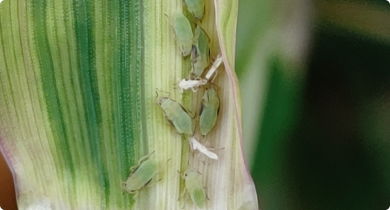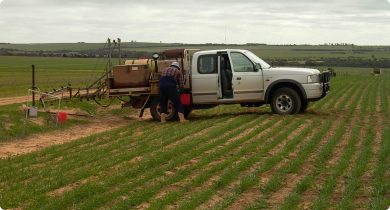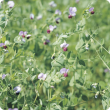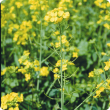Grains
The Department of Primary Industries and Regional Development has significant direct investment in grains research, development and extension capability and activities, research infrastructure and policy development.
The Western Australian grains industry is a major contributor to the agrifood sector and the Australian economy. WA produces on average 18 million tonnes of grains (cereals, oilseeds and pulses) each year. Grain exports generate more than $5.9 billion (five year average) for the WA economy each year – making it the largest agricultural sector in the state, and the fifth largest export industry overall after iron ore, oil and gas, gold and lithium.
WA exports about 80% of its annual grain production to more than 50 countries worldwide. Indonesia is WA’s top wheat export market worth over $880 million per year, followed by China ($750 million) and Vietnam ($610million) over the last five years. WA is the world’s leading supplier of premium malting barley to Japan, China and India, the major supplier of wheat for the Japanese udon noodle market, and a major feed barley supplier to the Middle East.
In the 2021/22 season it is estimated the WA grains industry exported a total of $6 billion of cereals and $3.2 billion of pulse and oilseeds. The major contributors to these exports were wheat ($3.9 billion), canola ($3.0 billion), barley ($1.4 billion), lupins ($200 million) and oats ($160 million).
Grains Research and Industry Development Projects
DPIRD strives to provide essential knowledge and tools to increase profitability, meet market requirements, and improve the economic development of WA.
Research is undertaken in collaborative projects with other state government agencies, universities, CSIRO, grower groups, growers, and commercial partners.
DPIRD Grains priority projects
2024 Crop Sowing Guide for WA
The Crop Sowing Guide for Western Australia is a one stop shop for variety information on all the major crops grown in Western Australia, compiled by officers in DPIRD.
This edition includes the major crops grown in WA – wheat, barley, canola, oat, lupins and pulses. The publication aims to provide information to support growers with decisions on the best choice of variety for each of the major crops for the upcoming season. The lupin and pulse sections also include an “agronomy guide” summary to support management decisions required for these high value industries.
Hardcopies of the 2024 Crop Sowing Guide for Western Australia are available from DPIRD offices and other agribusiness outlets. Learn more
See Also
- Grains Research and Industry Development Projects
- 2024 WA Crop Sowing Guide
- The Western Australian Government’s investment in the state's A$5 billion grains industry
- Primary Industries Development Research Highlights 2021
- Grains industry partners and collaborators
- MyCrop
- Season 2025: information for WA farmers
Filter by search
Filter by topic
- Pests, weeds & diseases (584) Apply Pests, weeds & diseases filter
- Diseases (455) Apply Diseases filter
- Crop diseases (394) Apply Crop diseases filter
- Fungi (368) Apply Fungi filter
- Pulses (329) Apply Pulses filter
- Field peas (303) Apply Field peas filter
- Canola (208) Apply Canola filter
- Grains research & development (203) Apply Grains research & development filter
- Production & postharvest (190) Apply Production & postharvest filter
- Wheat (135) Apply Wheat filter
- Climate, land & water (106) Apply Climate, land & water filter
- Control methods (84) Apply Control methods filter
- Lupins (81) Apply Lupins filter
- Plant nutrition (75) Apply Plant nutrition filter
- Barley (75) Apply Barley filter
- Chemicals (71) Apply Chemicals filter
- Soils (64) Apply Soils filter
- Pests (62) Apply Pests filter
- Oats (57) Apply Oats filter
- Weeds (49) Apply Weeds filter
- Sowing (47) Apply Sowing filter
- Crop weeds (43) Apply Crop weeds filter
- Pest insects (42) Apply Pest insects filter
- Managing soils (41) Apply Managing soils filter
- Herbicides (39) Apply Herbicides filter
- Climate & weather (38) Apply Climate & weather filter
- Fertiliser (23) Apply Fertiliser filter
- Soil management (22) Apply Soil management filter
- Breeding & varieties (22) Apply Breeding & varieties filter
- Soil acidity (20) Apply Soil acidity filter
- Pastures (20) Apply Pastures filter
- Frost (19) Apply Frost filter
- Mechanical, physical and cultural (18) Apply Mechanical, physical and cultural filter
- Harvesting (17) Apply Harvesting filter
- Soil constraints (17) Apply Soil constraints filter
- Genetic modification (17) Apply Genetic modification filter
- Viruses & virus-like (16) Apply Viruses & virus-like filter
- Grains Research & Development (16) Apply Grains Research & Development filter
- Livestock & animals (14) Apply Livestock & animals filter
- Fungicides (14) Apply Fungicides filter
- Hay production (14) Apply Hay production filter
- Water repellence (12) Apply Water repellence filter
- Horticulture (12) Apply Horticulture filter
- Climate change (11) Apply Climate change filter
- Measuring and assessing soils (11) Apply Measuring and assessing soils filter
- Liming (11) Apply Liming filter
- Irrigated crops (10) Apply Irrigated crops filter
- Agribusiness Food & Trade (10) Apply Agribusiness Food & Trade filter





